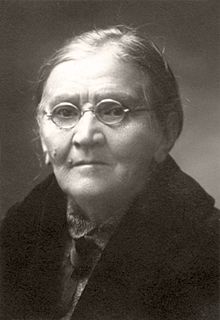Tsarevna Miladinova-Aleksieva (Bulgarian: Царевна Миладинова; 1856–1934) was a Bulgarian educator who became a driving force behind girls' education in what was then the Ottoman Empire, known for her role in founding the Bulgarian Girls' High School of Thessaloniki.
Tsarevna Miladinova-Alexieva | |
|---|---|
 | |
| Born | 1856 |
| Died | 1934 |
| Occupation(s) | Educator, founding director of the Bulgarian Girls' High School of Thessaloniki |
Early life and education
editTsarevna Miladinova was born in 1856 in Struga, a town in what is now North Macedonia.[1][2]
Her father was Dimitar Miladinov, an influential folklorist and activist in the Bulgarian national movement, and she would share his Bulgarian nationalist views throughout her life.[1][3]
When she was a child, the Russian consul noticed her reading during church services, and he offered to bring her with him to Russia to pursue her education.[4] After taking him up on his offer, she graduated from a girls' high school in Kyiv, becoming one of various female members of the intelligentsia educated in Russia at that time.[1][5]
Career
editAfter finishing school, Miladinova returned to Bulgaria and worked as a teacher while helping to found girls' schools across the region, including in Shumen, Etropole, Svishtov, and Prilep.[1]
She taught a special class for girls within a boys' school in Shumen in the mid-1870s.[4] Then, after working in Svishtov for a period, she gave up her position there to move to Thessaloniki, in what is now Greece, where efforts at educating young Bulgarians were beginning.[6] She lived in Thessaloniki from 1882 to 1913,[3] and she is best known for her work at the Bulgarian Girls' High School of Thessaloniki, which she co-founded.[1] She was the first director of the school, which opened in 1882.[7][8]
Miladinova was one of Bulgaria's best-known teachers of the period,[9] and in her later years her writings on her life and ideas appeared in various regional magazines.[3]
Death and legacy
editMiladinova died in 1934 in Sofia, Bulgaria.[2][10]
Her writings were first compiled and published posthumously as Epoha, zemya i hora in 1939.[3] An updated version with unpublished manuscripts and documents was then published under the same title in 1985.[3][9][11][12]
External links
edit- A digitized version of Epoha, zemya i hora (in Bulgarian)
References
edit- ^ a b c d e "Tsarevna Miladinova-Alexieva (1856-1934)". Women and the Transfer of Knowledge in the Black Sea Region. 2018. Retrieved 2021-04-08.
- ^ a b Prévot, Fabienne. "Alexieva MILADINOVA". La Dictionnaire universel des créatrices. Retrieved 2021-04-08.
- ^ a b c d e Miladinova, Elisaveta; Radkova, Rumyana (1985). "Foreword". ЕПОХА, ЗЕМЯ И ХОРА, Из българското минало - по издадени и неиздадени ръкописи на Царевна Миладинова-Алексиева (in Bulgarian). Sofia: Patriotic Front.
- ^ a b Daskalova, Krassimira (2017-01-30). "Developments in Bulgarian Education: from the Ottoman Empire to the Nation-State and beyond, 1800-1940s". Espacio, Tiempo y Educación. 4 (1). doi:10.14516/ete.163. ISSN 2340-7263.
- ^ Goodman, J.; Rogers, R.; Albisetti, J. (2010-05-10). Girls' Secondary Education in the Western World: From the 18th to the 20th Century. Springer. ISBN 978-0-230-10671-0.
- ^ MacDermott, Mercia (1978). Freedom or Death. The Life of Gotsé Delchev. The Journeyman Press.
- ^ Bozeva-Abazi, Katrin (February 2003). "The Shaping of Bulgarian and Serbian National Identities, 1800s-1900s". McGill University.
- ^ Izvestii︠a︡ na Instituta za istorii︠a︡ (in Bulgarian). Izd-vo na Bŭlgarskata akademii︠a︡ na naukite. 1981.
- ^ a b Gavrilova, Raĭna; Gavrilova, Rajna D. (1999). Bulgarian Urban Culture in the Eighteenth and Nineteenth Centuries. Susquehanna University Press. ISBN 978-1-57591-015-4.
- ^ "Царевна Миладинова-Алексиева от Струга, Вардарска Македония - "Народна поезия на България"". Strumski Library and Publishing House (in Bulgarian). Retrieved 2021-04-08.
- ^ "ПОХА, ЗЕМЯ И ХОРА, Из българското минало - по издадени и неиздадени ръкописи на Царевна Миладинова-Алексиева". Books about Macedonia (in Bulgarian). Retrieved 2021-04-08.
- ^ Livezeanu, Irina; Zirin, Mary Fleming (2007). Women and Gender in Central and Eastern Europe, Russia, and Eurasia: A Comprehensive Bibliography. M.E. Sharpe. ISBN 978-0-7656-2444-4.